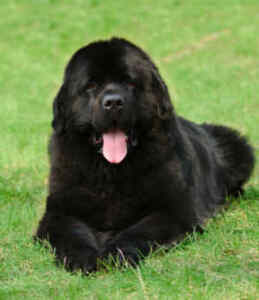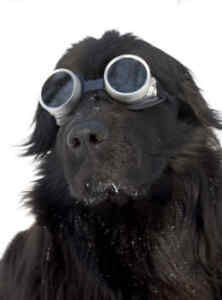Introduction: Meet the Newfoundland Dog, a Gentle Giant with a Heart of Gold
The Newfoundland dog, often referred to as a gentle giant, is a breed known for its impressive size, gentle nature, and unwavering loyalty. These dogs have captured the hearts of many with their kind and loving personalities, making them a popular choice for families and individuals alike. In this article, we will delve into the history, physical characteristics, temperament, training, health, exercise needs, and unique abilities of Newfoundland dogs. We will also debunk common myths surrounding this remarkable breed and provide considerations for potential owners.

History and Origins: Tracing the Roots of the Newfoundland Breed
The Newfoundland breed originated in Newfoundland, Canada, where they were primarily used as working dogs by fishermen. Their ancestors are believed to be a mix of indigenous dogs and European breeds brought by explorers and settlers. These dogs were bred to be versatile and capable of performing various tasks, such as hauling fishing nets, pulling carts, and even rescuing people from the water. Their webbed feet, thick double coat, and muscular build made them well-suited for these demanding tasks.
Physical Characteristics: Exploring the Impressive Size and Appearance of Newfoundland Dogs

Newfoundland dogs are known for their massive size, with males typically weighing between 130-150 pounds and standing 28 inches tall at the shoulder. Females are slightly smaller, weighing between 100-120 pounds and standing 26 inches tall.
Their large, broad heads are adorned with expressive, kind eyes that reflect their gentle nature. They have a thick, water-resistant double coat that comes in various colors, including black, brown, gray, and Landseer (white with black markings). Their powerful bodies are supported by strong, muscular legs, allowing them to move with grace and agility despite their size.
Temperament and Personality: Unveiling the Gentle and Loving Nature of Newfoundlands
Newfoundlands are renowned for their gentle and loving nature, earning them the nickname “gentle giants.” They are known to be patient, calm, and incredibly tolerant, making them excellent companions for families with children and other pets.
Their kind and nurturing disposition extends beyond their immediate family, as they are often friendly and welcoming to strangers. This breed is highly intelligent and eager to please, which makes them relatively easy to train. They are also known for their loyalty and protective instincts, making them excellent watchdogs.
Training and Socialization: Tips for Nurturing the Best Qualities of Newfoundland Dogs
Training and socialization are crucial for Newfoundland dogs to ensure they develop into well-rounded and obedient companions. Early socialization is essential to expose them to various people, animals, and environments, helping them become confident and adaptable.
Positive reinforcement training methods, such as rewards and praise, work best with this breed, as they respond well to gentle guidance and encouragement. Consistency and patience are key when training Newfoundland dogs, as they can be independent thinkers at times. Basic obedience commands, leash training, and proper manners should be taught from an early age to establish a strong foundation.
Health and Care: Understanding the Unique Needs and Challenges of this Giant Breed
Newfoundland dogs have a relatively short lifespan compared to smaller breeds, with an average life expectancy of 8-10 years. They are prone to certain health issues, including hip and elbow dysplasia, heart conditions, and a genetic condition called cystinuria, which affects the urinary system.
Regular veterinary check-ups, a proper Newfoundland dog nutrition and diet, and appropriate exercise are essential for maintaining their overall health. Their thick double coat requires regular grooming to prevent matting and to keep their skin and coat healthy. Additionally, their ears should be checked and cleaned regularly to prevent infections.
Exercise and Activity: Keeping Newfoundland Dogs Happy and Healthy
Despite their large size, Newfoundland dogs do not require excessive exercise. However, they do need regular physical activity to keep them mentally stimulated and physically fit. Daily walks, swimming sessions, and playtime in a securely fenced yard are recommended to meet their exercise needs.
Swimming is particularly beneficial for this breed, as they are natural water lovers and have excellent swimming abilities. Engaging in activities such as water rescue training or participating in water sports can provide both mental and physical stimulation for Newfoundland dogs.
Family and Children: Discovering the Perfect Companion in a Newfoundland Dog
Newfoundland dogs are known for their gentle and patient nature, making them excellent companions for families with children. They are often referred to as “nanny dogs” due to their protective instincts and their ability to form strong bonds with children.
Their size and strength should be taken into consideration when interacting with younger children, as accidental knocks or bumps can occur. Supervision is crucial to ensure the safety of both the dog and the child. Proper socialization from an early age will help them develop into well-mannered and tolerant family pets.
Water Rescue Abilities: Unraveling the Lifesaving Skills of Newfoundland Dogs
One of the most remarkable qualities of Newfoundland dogs is their natural ability in water rescue. Their webbed feet, strong swimming skills, and innate instinct to save lives make them ideal candidates for water rescue work. Throughout history, Newfoundland dogs have been credited with saving countless lives, both on land and in water. Their large lung capacity, buoyancy, and thick coat provide them with the necessary tools to navigate through rough waters and harsh conditions. Today, Newfoundland dogs continue to excel in water rescue training and are often employed as search and rescue dogs.
Famous Newfoundlands: Celebrating the Contributions of this Remarkable Breed
Newfoundland dogs have made their mark in various fields and have gained recognition for their exceptional abilities. One notable Newfoundland was “Seaman,” who accompanied Meriwether Lewis and William Clark on their famous expedition across North America. Seaman’s loyalty, strength, and adaptability were invaluable to the success of the expedition. Another famous Newfoundland, “Nana,” was the beloved nanny dog in J.M. Barrie’s play, Peter Pan. Nana’s nurturing and protective nature perfectly embodied the characteristics of this remarkable breed.
Newfoundland Dog Myths: Debunking Common Misconceptions about this Gentle Giant
Despite their gentle and loving nature, Newfoundland dogs are often subject to misconceptions and myths. One common myth is that they drool excessively. While it is true that Newfoundland dogs can drool, it is not excessive compared to other breeds. Another myth is that they require a large living space. While they do appreciate having room to move around, they can adapt well to various living situations, including apartments, as long as their exercise needs are met. It is important to separate fact from fiction when considering a Newfoundland dog as a pet.
Is a Newfoundland Dog Right for You? Considerations for Potential Owners
Before bringing a Newfoundland dog into your life, it is essential to consider various factors. Their size and strength require a commitment to training and socialization to ensure they are well-behaved and manageable. Their grooming needs, including regular brushing and occasional bathing, should also be taken into account. Additionally, their potential health issues and shorter lifespan should be considered. Newfoundland dogs thrive in homes where they receive ample love, attention, and exercise. If you are prepared to provide the necessary care and attention, a Newfoundland dog can be a loving and loyal companion for many years to come.
In conclusion, Newfoundland dogs are truly gentle giants with hearts of gold. Their history, physical characteristics, temperament, training needs, health considerations, exercise requirements, and unique abilities make them a remarkable breed. Despite common misconceptions, Newfoundland dogs are loving, loyal, and well-suited for families with children. Their water rescue abilities and contributions to various fields further highlight their exceptional qualities. If you are ready to embrace the joys and challenges of owning a Newfoundland dog, you will be rewarded with a loyal and loving companion who will bring endless joy to your life.
